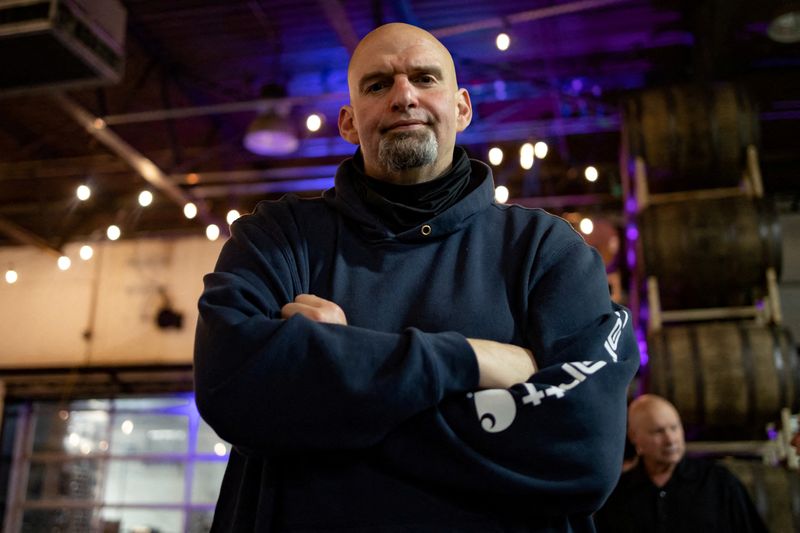One can easily argue that John Fetterman is one of the last few sane members of the Democrat party in Washington, D.C., but now party loyalists are trying to take him out.
In an era where political tribalism reigns supreme, Sen. John Fetterman of Pennsylvania stands out as a rare figure in the Democratic Party—a politician guided by principle over party loyalty. His willingness to break ranks, most recently in his openness to supporting President Donald Trump’s controversial nominee for defense secretary, Pete Hegseth, has cemented his reputation as a maverick. But this independence comes at a cost. The Democratic establishment, increasingly intolerant of dissent, appears to be gearing up to sideline him.
Fetterman’s refusal to engage in a one-on-one meeting with Sen. Patty Murray, a respected senior Democrat, over the Hegseth nomination speaks volumes. Murray, known for her straight-talking style, reportedly sought to persuade—or perhaps pressure—Fetterman to toe the party line. Fetterman, anticipating a lecture, declined the meeting. This wasn’t petulance; it was a deliberate stand against the Democratic Party’s growing obsession with conformity. As one source close to Fetterman put it, “He figured that she wanted to yell at him about it.”
The episode underscores a broader truth: Fetterman is a man who trusts his instincts and refuses to be cowed by party elders.
This isn’t the first time Fetterman has defied the Democratic machine. Since taking office, he’s consistently challenged progressive orthodoxy. He’s been vocal about his support for Israel, a stance that puts him at odds with the party’s increasingly vocal anti-Israel wing.
He’s criticized the left’s soft-on-crime policies, drawing from his experience as a small-town mayor who tackled violence head-on. And he’s shown a willingness to engage with ideas from across the aisle, even when it earns him scorn from his own side. In a party that demands ideological purity, Fetterman’s pragmatism is a breath of fresh air.
But his independence is precisely what makes him a target. The Democratic Party, now dominated by its progressive wing, has little patience for dissenters. The push to enforce lockstep loyalty is evident in the way party leaders handle internal disagreements—through pressure, public shaming, or, as in Fetterman’s case, attempts to rein in outliers behind closed doors. Murray’s outreach, while framed as collegial, was likely an attempt to bring Fetterman back into the fold. His refusal to play ball signals that he’s not just a thorn in the party’s side but a threat to its carefully curated unity.
The effort to marginalize Fetterman isn’t just about one senator. It’s a warning to others who might dare to think for themselves. The Democratic Party’s leadership seems more interested in silencing voices like Fetterman’s than addressing the reasons voters are increasingly disillusioned with their brand. Fetterman’s appeal—his authenticity, his willingness to call out nonsense on both sides—resonates with Americans tired of scripted politicians.
Yet, instead of embracing this strength, the party appears determined to snuff it out.
The irony is that Fetterman’s approach could be the Democrats’ salvation. At a time when trust in institutions is at historic lows, his unfiltered style and willingness to engage with tough issues head-on could rebuild bridges with voters who feel ignored.
His openness to considering Hegseth, despite the nominee’s baggage, reflects a commitment to fairness over blind partisanship. But rather than seeing this as an asset, the party views it as a liability.
The Democratic establishment’s move to take Fetterman down—whether through exclusion, pressure, or eventual primary challenges—reveals a deeper rot. A party that can’t tolerate a figure as grounded and principled as Fetterman is a party in decline. If Democrats succeed in sidelining him, they’ll lose more than just a senator; they’ll lose a voice of reason in a sea of ideological extremism. And that’s a loss they can ill afford.
Fetterman’s fight is bigger than one man or one vote. It’s about whether there’s still room in the Democratic Party for independent thought. If the party’s leaders have their way, the answer is a resounding no. But if Fetterman stands his ground—and if voters rally behind him—he could prove that sanity still has a place in politics. For now, he’s one of the last of his kind. The question is whether the Democrats will let him survive.
